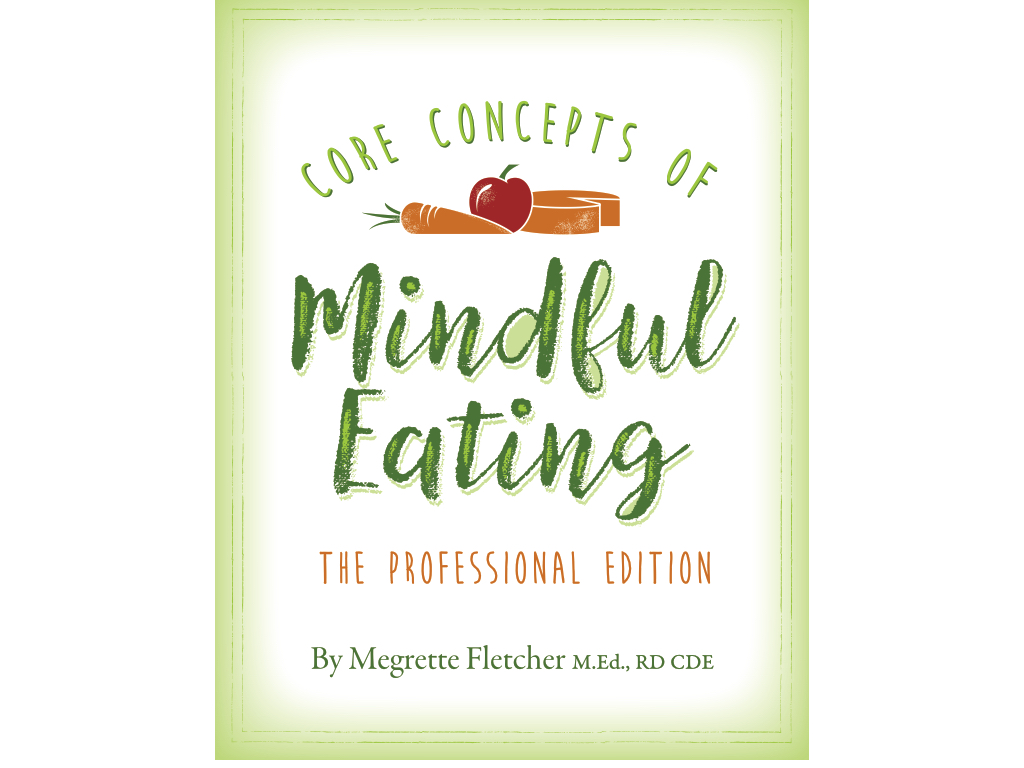
Finally, Health Care Professionals can explore The Core Concepts of Mindful Eating, all in one place, to help them save time, energize their counseling sessions, and help their clients create compassionate, sustainable health changes. Core Concepts of Mindful Eating brings Mindful Eating research, the proven counseling techniques of Motivational Interviewing, Nonviolent Communication, along with Megrette’s professional understanding organized into one helpful resource. This 164-page guide is filled with beautiful graphics, engaging thought provoking questions, and genuine counseling situations to deepen your understanding of mindful eating.
The Core Concepts of Mindful Eating is every professional’s How-To book explaining much more than the benefits of mindful eating. It delivers evidence-based counseling techniques that include Motivational Interviewing, Self-compassion training, Non-violent Communication, and 25 years of Megrette’s practical experience broken down into three understandable sections.
Introduction: Why Mindful Eating?
Section 1: Non-Judgment, Meditation, and Self-kindness. This section focuses on engaging in knowledge – defining non-judgment, meditation, and self-kindness.
Section 2: Introduces the Mindful Eating Map. This map outlines five steps to bring mindful eating into daily practice. This section builds on the learning of non-judgment, meditation, and self-kindness and allows the mind to focus and remain present with sensory/physical, cognitive/thought, and emotional/feelings
Section 3: Will have you continue using the mindful eating map, completing steps 3-5. Here you will explore the concept of personal needs and take steps to reduce any unmet needs. Understanding the difference between creating an intention and forming goals, this section will help you complete these few remaining steps to advocate for yourself ethically.
The Core Concepts of Mindful Eating is a workbook that provides a deep-dive into a variety of counseling situations. You will explore the concepts of mindful eating by meeting four friends:
Linda is a middle-aged woman with a long history of trying new programs and diets to change some aspect of her health. She has verbalized a fear of “failing again” and feels an urgent need to change her diet and lose 30 pounds. As you meet Linda, listen for a deeper pattern of disordered eating behavior. Linda was recently diagnosed with prediabetes, and she was told to lose weight to cure this problem.
David is a young man who is disabled following a motor-vehicle accident. He is in chronic pain, and walking and lifting objects are very difficult to him. David was trained in the culinary arts and is a “foodie.” He is nderweight, and he would like to eat better, feel better, and regain the 14 pounds he has lost.
Sita is a college student who calls herself a vegetarian and sometimes a vegan. She knows she is “overweight” and has expressed a desire to be healthier. She likes to say, “I love the way I look, but I don’t really.” She says, “I’m OK with my size,” and is very clear that she is not interested in weight loss. She likes learning, she reads a lot on the internet, and she feels that, since she started college, her vegetarian diet hasn’t been balanced, and this is her goal.
Jerome is a normal-weight, but very picky, 13-year-old who participates in a variety of sports. His mother, Myra, is a child-care provider who is struggling with her son and his eating habits, which are disruptive to the family. Jerome is at the session to improve the variety of his diet and to eat healthier.
Each chapter uses the following five-part format to make learning about mindful eating approachable and real.
Empathizing – This section will precede each chapter and will give you more information about the client who will be presented in the chapter.
Connecting — Funny stories or mistakes that may help you connect and join these concepts together.
Counseling Activity – Techniques you may try, exploring your learning, to help you imagine a session with one of the four clients you will get to know throughout the book.
Going Deeper — You will have an opportunity to decide what was effective and what was not.
Chapter Summary – This will cover the following:
10-week online live training offered every fall (September), winter (January), or spring (March)
A 3-day retreat at Aryaloka Buddhist Retreat Center in Newmarket, New Hampshire. Typically offered every fall and spring.
225 pages with study guide and evaluation questions. Includes CPE reporting form for the Academy of Nutrition and Dietetics. 32 CPEs.